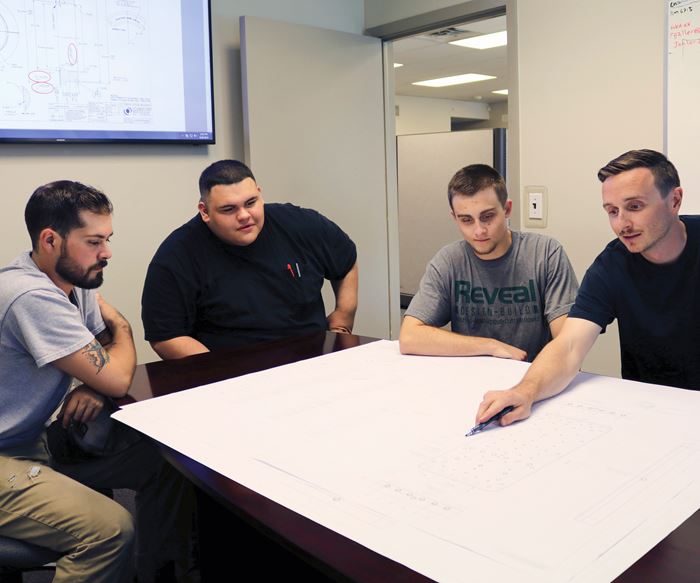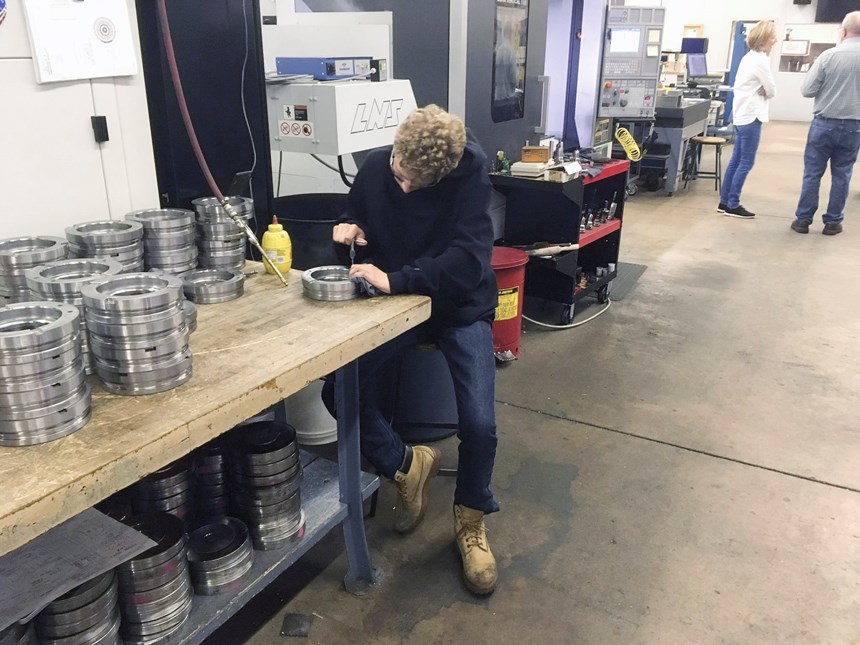Creating Moldmakers by Offering Training and Cultivating Passion
Several mold manufacturing companies have shared how their workforce development strategies have evolved to meet the needs of today’s industry. Here, Janler Corp. outlines its approach to workforce development, which is largely about seeking and cultivating passion and motivation in new recruits.
Janler Corp. in Chicago, Illinois, is a second-generation, family-owned company with a long and active history in the moldmaking industry. The company specializes in the design and development of complex injection molds and offers in-house injection molding services. It is critical that the company’s pipeline of new talent flows with young apprentices who exhibit, as Janler President Carol Ebel puts it, a willingness to pull work and push forward—with a lot of passion.
“Janler has re-instituted its formal apprenticeship program, and management is committed to continually working on content to make it more effective for training the workforce of the future. The program is a work in progress that began over 60 years ago when the company was started in 1952,” she says.
Ebel explains that Kurt Mohrbacher, Janler’s operations manager, recommended a document that lays out the commitment of the company and employee—laying down the framework of the relationship. “It states our commitment and asks for the apprentice’s commitment, and it identifies the pathway to success for a young person interested in becoming a precision machinist or moldmaker,” she says. “As we resurrected our apprenticeship program, some of the questions we asked included: What are the outcomes desired today and for the future? What are the current building blocks of the training? Where do we start? In earlier days, an apprentice started in the clean-up area and maybe on a drill and then a Bridgeport. Now our people are learning on CNC lathes and mills, and they learn the old with the use of new technologies. Our apprentices are performing work that adds high value very quickly as a result.”
Essentially, the program incorporates formal training that Technology and Manufacturing Association (TMA) provides. The training has a three-year apprenticeship program, combined with community college classroom and lab training, plus mentoring and hands-on experience in the different departments at Janler. The company expects that an apprentice will spend more than 1,000 hours in each of the different departments to obtain, at a minimum, a solid base understanding of the different machining processes and outputs. Expertise comes after the learning phase, as apprentices spend time building their skills through hands-on experience.
The company uses its Enterprise Resource Planning (ERP) system to track and document the hours an apprentice spends learning the processes in each department in Janler’s shop. “The apprenticeship program identifies specific knowledge and skills that the apprentice needs to acquire along the journey, while the ERP system, in essence, gives the apprentice the opportunity to steer the training in order to learn the required skills,” Ebel says. “It is a system of push and pull, where the company is engaged in offering the training (pushing it out), and the apprentice is engaged in gaining skills as fast as he or she can (the pulling).”
Ebel adds that Janler has recently decided to include another dimension to its apprenticeship training: regularly scheduled lunch-and-learns to quicken the exposure to the plastic engineering world. She says that these sessions are designed to expose the employee to experts supporting the process of mold building. The intended 26 sessions a year include the concepts and technical details of steel selection, heat treating, surface treatments, mold design features, CNC tooling, mold set-up, the molding machine, materials, metrology, safety, mold and machine maintenance and operations-management concepts. In addition to the industry skills, the company offers sessions on life skills related to personal budgeting, 401k and health benefits and financial and legal concepts such as leases and mortgages. “It’s important to share life’s lessons—to influence and expose young people so that they can make healthy decisions. The trade is demanding, and starting out on a solid foundation is important. These are high-skilled positions. Moldmakers end up as project managers, manufacturing engineers, tooling engineers and plastic experts through experience and training. We need our people to be that well-trained. Mold manufacturing is here to stay, and the training needs to address all aspects of it,” she says.
Mold manufacturing is here to stay, and the training needs to address all aspects of it.
Mohrbacher emphasizes that at its core, Janler’s apprentice program is geared toward creating a moldmaker. “My definition of a moldmaker is a guy who understands how a mold functions. He knows what happens when plastic is injected, what a vent does and how cooling works, and so on,” he says. “I will go a step further and say a true, all-around moldmaker should be able to understand the design of a mold. He should understand how to build the mold and understand the outcome of the mold sampling process, and that is what we are teaching our young employees.”
It is a system of push and pull, where the company is engaged in offering the training (pushing it out), and the apprentice is engaged in gaining skills as fast as he or she is able to (the pulling).
“The basis of our system is passion and motivation,” Ebel says. “We cannot create this—it is within the person and continues to grow along their journey. We've had guys we selected that appeared to be good in the interview, and we talk to them a lot about our core values. Are they intelligent and independent? Do they seek real answers, and are they determined? Do they pull work, and are they team players and problem solvers? Are they open to challenges? Those are our core values. If candidates have that kind of personality and possess that kind of determination and passion, this could be the place for them, because they need those attributes to be a good moldmaker.”
Mohrbacher says, “We have witnessed the industry go from mold shops at every corner to now, when we talk to people about getting into the mold industry, and they have no idea what we are talking about. They don't teach this stuff in school anymore. Shop classes are just coming back. Everybody was expected to go to college and get four-year degrees. They're not realizing that many guys in this trade make more money than guys out there with PhDs.”
Janler currently has four apprentices ranging in experience from being entry level to having three years of training. New recruits are found using more traditional methods including the internet and referrals. Ebel says, “As an employer, we can offer the training and the opportunity to master a skill. We have found that it does not always work out. Still, we must keep adding to our bench. We have lost employees to competition after investing in three and four years of training, but we know our program is supporting the development of an industry of highly skilled people, and we believe our efforts will be rewarded in return.”
The Janler team supports efforts to educate other mold shop owners as well as the public about the need for apprenticeship programs and training. Ebel, who has served as Janler’s president since 1989, was the first woman to chair the board of the TMA. She also served as chairman of the TMA Education Foundation, the mission of which is to provide funding to schools building technical training programs. She received the organization’s Rose Mottl Leadership in Manufacturing Award in 2013 for her contributions to the manufacturing industry. Her brothers, Alan Klingler and Charles Klingler, both vice presidents of Janler, serve the industry as well. Charles currently serves as president of the Chicago Chapter of the American Mold Builders Association. He is very active with its education committee and its efforts to promote moldmaking as a viable career.
“I think when a company has an apprenticeship program, and that company commits to training, it is evidence of the company’s confidence in the future growth of the industry,” Ebel says. “We believe passion is a critical component to success. We wake up passionate about the business, and we want our entire team to feel the same way.”
Related Content
MMT Chats: The Connection Between Additive Manufacturing Education and ROI
This MMT Chat continues the conversation with Action Mold and Machining, as two members of the Additive Manufacturing team dig a little deeper into AM education, AM’s return on investment and the facility and equipment requirements to implement AM properly.
Read MoreHands-on Workshop Teaches Mold Maintenance Process
Intensive workshop teaches the process of mold maintenance to help put an end to the firefighting culture of many toolrooms.
Read MoreHow to Improve Your Current Efficiency Rate
An alternative approach to taking on more EDM-intensive work when technology and personnel investment is not an option.
Read MoreHow to Foster Innovation Through a Culture of Education, Mentoring
Dynamic Tool Corp. shares its strategy for building a team with the right attitude and aptitude to deliver innovation that meets customer expectations.
Read MoreRead Next
Are You a Moldmaker Considering 3D Printing? Consider the 3D Printing Workshop at NPE2024
Presentations will cover 3D printing for mold tooling, material innovation, product development, bridge production and full-scale, high-volume additive manufacturing.
Read MoreReasons to Use Fiber Lasers for Mold Cleaning
Fiber lasers offer a simplicity, speed, control and portability, minimizing mold cleaning risks.
Read MoreHow to Use Strategic Planning Tools, Data to Manage the Human Side of Business
Q&A with Marion Wells, MMT EAB member and founder of Human Asset Management.
Read More























